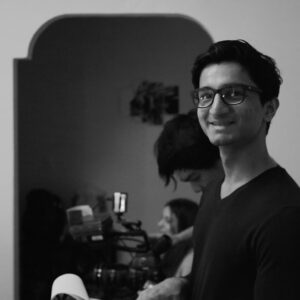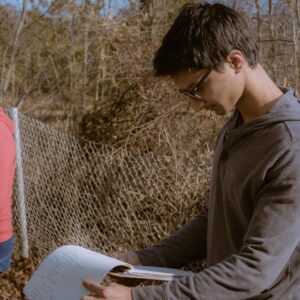Lots of things come to mind when thinking of New York City. Bright lights, masses of people, dirt, hustle bustle, loud sounds. But never empty streets. Never people staying in their homes. An apartment in New York City serves to deposit your things and sleep (once in a while). It doesn’t matter if your apartment is the size of a closet. You are always on the run anyway. But now: stuck in your own prison. Time for sleep. Time for yourself. Time to calm down.
And what does this mean for young artists? Young artists whose sole purpose is to prove themselves in this huge city. What does it mean for young international artists who need to build up credits for their Visa? A Visa that seems more and more impossible to get in the current climate.
International students’ F-1 Visas are at risk, due to Trump’s new Visa rules stating that all international students would have to return to their home countries if not taking a course in person. All other Visa processes are delayed as well due to the pandemic. All in all, not a great time to be on a Visa in the US.
But NYC is the city of dreams after all. So, international artists who come here are strong believers in their dreams and usually, do not easily give up on them.
Here is one international artist whose spirit and work are as strong as ever. Someone who always puts his Art first. Pranav Kothary is a filmmaker from Mumbai, India, where he grew up. He graduated from NYU Tisch School of the Arts and currently resides in New York City. His work has been showcased in New York, Mumbai, Melbourne, and Tokyo, including the Best Global Shorts Film Festival, Big Apple Film Festival, Filmingo International Film Festival, Tokyo Lift-Off Film Festival and the New York Lift-Off Film Festival. He was nominated for the Oliver Stone Screenwriting Award and received the Cohen Fund for Student Producers for his final project at NYU, which is currently in consideration for festivals around the world.
Pranav is currently editing an independent feature-film, writing two features, is in the middle of post-production for several shorts and putting forth some interesting ideas with all the extra time.

Hi Pranav. Thanks for talking to me, even though we can’t meet in person at the moment. How are you coping with the Corona crisis so far?
“Oh geez, I’m lucky enough to be able to stay busy right now. I had a lot of projects in post and I’ve been working on them. I’m also very lucky to have a bunch of tools and resources at home, like a computer and instruments, etc. I honestly cannot imagine the boredom of someone who’s not in a field like mine, and can’t do what they love from home. It seems to be a very interesting time for creatives though. I’m sure we could build an entire ‘pandemic museum’ out of all the inspiring stay-at-home art coming out right now. I had a teacher for this film class in which we had a bunch of restrictions like no sound, or no color, or only 2 characters, etc. And he’d always say that you’re most creative when there are restrictions, and I’ve come to agree with him. One project I had a lot of fun doing was this virtual jam session. I arranged a quick song and asked online for vocals, and it turned out quite well. So, I started another one, with a larger scope. This one has around 4-5 collaborations, and a music video accompanying it. It’s going to be hilarious, I’m very excited for everyone to see it.”
Can’t wait to see it. Tell me about your previous work. What makes you unique as a filmmaker?
“My previous work consists mostly of short dramas. The last film I completed was called Coming Home. It was the best/worst post production I’ve ever experienced. That’s what happens when you care too seriously about a film, right? Lately I’ve been doing a lot of comedy and parody (through which I had a chance to do other genres like action and horror), and I’ve been enjoying that. It’s lower stakes in my head, I can be more clinical. Weirdly enough it seems that all genre films are also parodies, and either they’re aware of it or not. So, it’s been fun doing them because it feels like a collaboration with the audience.
I don’t know what makes me unique as a filmmaker. I think if I knew I’d capitalize on that for every film, which would probably be boring.”

As a filmmaker from India, what draws you to New York? Would you ever consider the film industry in India?
“The film industry in Mumbai is really starting to pick up for people like me. It had been dominated and controlled by the studios for a long time. And I’m sure they’re still trying to gain back that control. I don’t hate the studios or anything. Some of my favorite films are by studios, but I do want there to be a sense of competition, not domination. Since the streaming giants came, it’s starting to democratize the whole industry.
There’s plenty of things about New York with which I’ve fallen in love since moving here. But what initially drew me to the city was the diversity. I realize I’ve started to take that for granted. Apart from that, I don’t think anybody will question how precious the energy in New York is. Mumbai does have a similar energy. In fact, it’s extremely similar to New York in a lot of ways. But it feels different, because I was born there. So, it feels less like my story and more like my dad’s story. “
What has the impact of the crisis on the film industry been, especially in NYC, and how do you think it will shape the future of the film industry?
“Well everything shut down of course. A couple of my projects did too, some got cancelled entirely, some lost a lot of money. It was definitely a huge setback for the entire industry, but it has been for everything else too, the entire economy. I’ve personally never been alive during a universal economic depression, and I’m curious to see how we’ll pick ourselves back up once this ends. I already know that it’s going to be very inspiring, so that excites me.
As for how this might shape the future of the film industry, I don’t think much will change in terms of filmmaking. I did however, wonder about the role of filmmakers in an economy that’s struggling. When put in terms of target audience, it’s quite apparent what purpose a blockbuster film has vs. a… different kind of film. But in a struggling economy we have to wonder, if the majority of our audience will want to escape, will there be a shift towards escapist-blockbuster films?”
With the current political climate, what do you consider to be the responsibility of filmmakers?
“I am utterly awestruck by the people of New York. I think one of the most important qualities of great artists is their vast potential for empathy. And all the stunning art I see in support of the BLM movement oozes empathy. It is honestly one of the most beautiful things I’ve experienced.
It’s something I’ve thought about quite a bit; the political responsibility of a filmmaker. And being a person of color who grew up not being a person of color in his own country, I think my thoughts on the matter might be very specific. I think the one and only responsibility of artists is to be truthful to themselves. Am I telling the truth?
I remember my first encounter with sexism. I was maybe 6 or 7 years old and my cousin (a girl) and I were teasing each other. She was calling me a girl and in response I teased her by calling her a boy. And she said; “So? I wouldn’t mind being a boy”. And I remember wondering why that was, that I’d mind being a girl but she wouldn’t mind being a boy. What had the two 6-year-olds seen that they knew it was better to be a boy in this world?
I refer to this instance quite often when thinking about art and politics. Yes, I feel responsible as a man for all the sexism in the world, but if I was to ever write a scene where two cousins are teasing each other about their gender, I’d write it exactly like it happened to me. I’ve got to be truthful, and the truth is that the world raised sexist people.”
What are your dreams for your career?
“To win 5 Oscars. Just kidding. I want to learn enough things that my wisdom is worth sharing, and I want to teach. I credit my teachers for so many priceless outcomes, and logically speaking I think that’s the only last step for any career. It’s like the parenting of careers.”
What would be your advice be to other young filmmakers?
“Keep learning different things. There’s so much to learn and everything can be applied to filmmaking in one way or another.”
What is your next project?
“What would have been my current project, if not for the pandemic, is a web series/feature film. It’s structured in a way that it can be edited as either. It’s a fictional documentary about a guy trying to put up a play in order to win back his ex. It is by far the most fun and exciting project I’ve done yet, and I cannot wait to get working on it again.”
Thank you. Can’t wait to hear more about your future successes. It is inspiring to speak to artists like you who stay true to themselves under any circumstances.
Even if most artists are out of work and not seemingly “relevant” or “necessary” to the system, we need them now more than ever. It is inspiring to talk to young artists like Pranav who continue to create Art under these restricting circumstances. Like he mentioned in his interview, sometimes restrictions help us be at our most creative. Something that the pandemic has proven.












